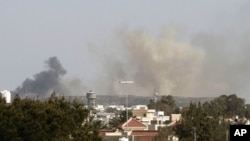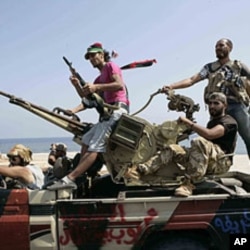The North Atlantic Treaty Organization has been a big factor in helping anti-Gadhafi forces gain the upper hand in Libya.
Since March of this year, NATO planes have been attacking forces loyal to Colonel Moammar Gadhafi. The international coalition is acting under a United Nations resolution authorizing member states to take “all necessary measures” to protect civilians and civilian-populated areas under threat of attack.
Analysts say by attacking Gadhafi’s forces, NATO has in essence become the air force of the anti-Gadhafi fighters and has helped turn possible defeat into an apparent victory.
“There is no doubt that military advisers from the West and reconnaissance as well as NATO bombings helped turn the tide," said Marc Ginsberg, a former U.S. Ambassador to Morocco and a NATO expert. "There is no way that the rebels would have achieved this victory, or at least appear to be on the verge of victory, without NATO’s active involvement.”
Anti-Gadhafi forces have taken control in most of Libya. And experts are now asking whether the NATO mission there was a success.
Weak alliance
Ambassador Ginsberg says the NATO operation in Libya showed weaknesses in the military alliance.
“The lack of coordination without United States actively providing front and center leadership," he said. "The fact that NATO countries didn’t have sufficient military resources to provide the rebels. We’re talking about a regime that was not particularly militarily strong. And it took six months to get to this point. So that says a lot about the lack of force on the ground and perhaps, to a certain degree, how long it took for NATO to get its act together.”
Sean Kay, a NATO expert at Ohio Wesleyan University, agrees.
“It’s way premature to call this anything like a success for NATO and in fact, I think the institution itself is going to come under some very significant questioning here in the United States, in Europe as well. Here we are, 60 years after World War II, and Britain and France, combined with other European allies, could not handle a war like Libya on their own, without the United States. That really raises some basic questions in America as to why are we subsidizing this organization. And I think that NATO comes out of this actually far weaker than it did going in,” said Kay.
Mission a success
But Charles Ries, NATO expert with the RAND Corporation, disagrees. He says the NATO mission is a success because, first of all, the alliance responded to a call for help from civilians being attacked by Gadhafi's forces.
“Secondly, it’s the first NATO armed mission in memory in which the Europeans have taken the operational lead," he said. "And this is something that has been much hoped for by the United States and has felt that it always has to take the lead and bear the disproportionate burden. In this case, France and Britain have taken the lead and press accounts have it that the French have flown a full third of the sorties. And I think that that is very good for the evolution of NATO.”
Ries says the Obama administration has been adept at mobilizing an international coalition.
“And allowing various countries to step forward and do what they could do and wanted to do," he said. "In years past, often times various allies would have ideas and the United States would listen to those ideas and then step all over them - and say this is what we’re going to do and you all fall in line.”
Ries and others say the Libyan example, where NATO nations other than the United States take a leading role, could be the way forward for the western alliance as it continues to redefine its role in a changing world.





